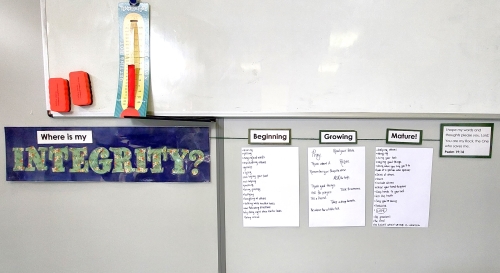Cultivating a Culture of Encouragement and Trust

I never intended to work in a Christian school. In fact, I fully intended to work in public schools in California. I felt that was my mission field, my call. After all, public schools urgently need Christian teachers, too! So I jumped fully into my teacher training in public university holding ever in front of me this question: how can I show Jesus to my students, even if I cannot speak His name?
Not until many years later would I hear the terms “biblical worldview” or “biblical integration,” yet God used my time in public university to train me well. I had to weigh everything against who I know God to be from my life and through His Word. In my credential program we were strongly urged to use “intrinsic motivation” with students instead of heavily relying on prizes and rewards. A chord was struck deep in my heart. I know in my life I do not try to be good because I feel God will reward me for my good actions. God does not say to me, “Kristiina, behave so you can have a sticker” or when I make a mistake, “Kristiina, go and move your pin down.” That is not my understanding of the Kingdom of Heaven. I seek to follow His will because it draws me closer to Him and His heart. What better motivation could I ask for?
As I studied, I also worked in an aftercare program for a local Christian school. My heart cringed each time I heard a colleague or student admonish another by saying, “Be good because God is watching you!” I dearly wanted each child to really know and grasp God’s love for them, and I found the lack of grace distasteful. Though I could share freely of Jesus there, I felt somehow the damage had already been done. After all, it is easier to behave for a physical reward. Reaching for the intangible is hard.
As I began my career, which did lead me to Christian schools eventually, I felt bound and determined to give encouraging intrinsically good behavior a solid try. The results were stunning. Students came and talked to me when they struggled, for admitting wrongdoing might have consequences yet no public shaming. One extraordinarily well-behaved student shared they were scared to move onto another class with a teacher who used a card system because he felt safe without it in mine. Rewards would come to the class of course (I bake way too many cookies to not share), yet they were shared collectively instead of separating off others from the group. We serve a God of grace and love…even my feistier students eventually settled into the routine, and I believe firmly that consistent grace and love had much to do with that.
Intrinsic motivation did not, however, mean that we did not talk about consequences of bad behavior. One year I had a particularly rowdy group of sixth grade boys that was tough to connect with. I was encouraged often to give up my convictions and just start offering rewards. Inspiration finally came from a workshop with other public school educators (once again, my mind always spinning through taking those ideas to show Jesus to my kids). I created with my  class something I dubbed the “Integrity Line.” I gave it three main sections: Beginning, Growing, and Mature. As a class we decided what each section would look like, and all the ideas were posted in the front of the room. Anytime a student began to slip, I would ask them to “check themselves” meaning for them to evaluate for themselves where they were on the line. I told them it was a private reflection between them, me, and the Lord. I got honest with my students, explaining that I would make mistakes (can we lead-foots admit we push limits as well?) Mistakes are a part of life, and no one is immune. We can stop and evaluate and find ways back to demonstrating integrity, though. This is a life skill, not just a class skill!
class something I dubbed the “Integrity Line.” I gave it three main sections: Beginning, Growing, and Mature. As a class we decided what each section would look like, and all the ideas were posted in the front of the room. Anytime a student began to slip, I would ask them to “check themselves” meaning for them to evaluate for themselves where they were on the line. I told them it was a private reflection between them, me, and the Lord. I got honest with my students, explaining that I would make mistakes (can we lead-foots admit we push limits as well?) Mistakes are a part of life, and no one is immune. We can stop and evaluate and find ways back to demonstrating integrity, though. This is a life skill, not just a class skill!
With this line, power struggles stopped. Conversations opened up. As students learned to trust me, I could learn better how to encourage them in their growth. Each year creating this line truly became my favorite part of the start to the school year. I would share with students that my personal desire to have integrity in my actions came from my growing love for Jesus. Doing well means I am closer to Him and get to know His heart well. Students would open wide and share their desires for this, too. The conversation would continue throughout the year as we would revisit the line. In thirteen years of teaching, I did not once use a reward system, and I praise God for all the conversations about Him, His love, and His grace that ensued as a result. Through these conversations, my classroom was filled with trust, encouragement, and love towards one another. I continue to pray for my students that their hearts become as King David’s: “May the words of my mouth and meditation of my heart be pleasing to You, Oh Lord, my Rock and my Redeemer” Psalm 19:14 (NLT).
Kristina Day
Kristiina is in her seventh year serving as Team Lead and a mentor teacher in Madrid, Spain. She has many years’ experience teaching upper elementary and middle school. She in particular loves sharing and instilling a love for reading in students. She has a passion for Spain and sharing God's love to her community through building relationships with those around her.
